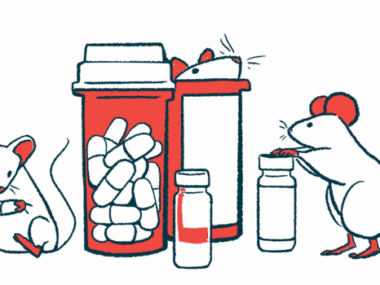Clinical Trial, Here We Come!
Written by |

If you have been following my column, you know that my 26-year-old daughter, Abby, has been on the verge of being accepted into a clinical trial for Sanfilippo syndrome. I am here to announce that it’s official! She was recently accepted, and we will soon venture west again to California, for Abby’s first visit as a participant in the trial.
The trial will test the effectiveness of a drug called Kineret (anakinra) on people like Abby who have Sanfilippo syndrome. Our hope is that it will help Abby with some nasty symptoms of Sanfilippo, like seizures, diarrhea, and sleep problems.
As mentioned in an earlier column about our first trip to California, we have trepidations about traveling so far with Abby. She can show signs of anxiety when in unfamiliar places, and this is naturally unsettling for us, since we can’t control the surroundings when not at home.
She did really well on our last trip when we drove, so we have decided to fly this time. This decision is fraught with many uncertainties, especially considering that the world is still in a pandemic, so tensions are generally high when in busy public places like airports.
Keeping in mind the potential for negative interactions and high emotions at the airport, you know how you can walk into a room or a space and sense a level of intensity or uneasiness? I have always felt that developmentally disabled people can sense this feeling even more deeply than neurotypical people. It’s hard to explain, but I have seen it in my work with special education students in public schools.
Picture a person feeling incredibly anxious or nervous about being somewhere and not being able to tell someone. This is what I imagine it is like for Abby when we are outside of her normal home environment. So, her dad and I take on our roles as her “bouncers” and ward off those who are critical or ignorant. And I’m anticipating there to be several people who fit into one or both of these categories while at the airport and on the airplane.
One thought I grapple with when thinking of this trip, and traveling with Abby in general, is how truly aware of her surroundings is she? People who experience cognitive decline, for any reason, eventually reach a point where they are unaware that they should be nervous or anxious about their surroundings. To experience a negative reaction such as anxiety, a certain level of cognition must be present.
I don’t think Abby has declined enough yet to fit this description. However, as callous as this sounds, this would be a situation where the saying “ignorance is bliss” is fitting. If she is not aware that she should be nervous about something, then she is hopefully spared the anxiety.
So, my next column will probably be written while on our journey to California. Send all the prayers, luck, and good vibes our way! My hope is that we are as pleasantly surprised with the outcomes as we were before. Updates to follow!
***
Note: Sanfilippo News is strictly a news and information website about the syndrome. It does not provide medical advice, diagnosis, or treatment. This content is not intended to be a substitute for professional medical advice, diagnosis, or treatment. Always seek the advice of your physician or other qualified health provider with any questions you may have regarding a medical condition. Never disregard professional medical advice or delay in seeking it because of something you have read on this website. The opinions expressed in this column are not those of Sanfilippo News or its parent company, Bionews, and are intended to spark discussion about issues pertaining to Sanfilippo syndrome.






Sallie Taylor
Best of luck. We have a daughter with SFIII who is 21, so empathize with your upcoming journey. The elevation change in a plane can wreak havoc (not just on SF patients, but on everyone!). Prayers.